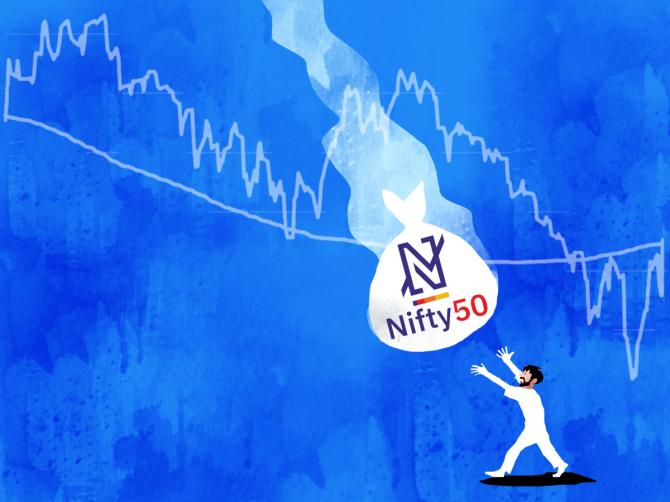Nifty Next 50 gives investors exposure to companies on their way to joining the top 50 as well as those transitioning towards the midcap space.

Passive funds tracking the National Stock Exchange Nifty Next 50 Index have seen their assets under management (AUM) more than double in the past year.
The index’s growing popularity can be attributed to its robust 50 per cent return over the same period.
Currently, the AUM of funds tracking the Nifty Next 50 index stands at nearly Rs 30,000 crore.
The top 10 schemes had a cumulative AUM of Rs 27,800 crore at the end of October 2024, up from Rs 13,400 crore a year ago.
These schemes are close to overtaking Bank Nifty schemes, which have an aggregate AUM of Rs 32,000 crore.
In the pecking order, the benchmark Nifty 50 and S&P BSE Sensex are the only other indices with higher AUM.
The Nifty 50 index comprises the top 50 stocks, while the Nifty Next 50 index, as the name implies, includes the next 50 companies.
Together, these two indices form the Nifty 100 index, offering a broader representation of the Indian stock market.
The growing popularity of the Nifty Next 50 intensifies competition in the largecap investment space, which is dominated by active largecap funds and passive schemes tracking the Nifty 50 and Sensex.
Wealth managers believe the Nifty Next 50’s position between the blue-chip Nifty 50 and midcaps make it a differentiated offering in the largecap space and a strategic addition to investor portfolios.
“Positioned between the Nifty 50 and midcap stocks, the Nifty Next 50 gives investors exposure to companies on their way to joining the top 50 as well as those transitioning towards the midcap space after exiting the Nifty 50.
"They can appeal to investors seeking slightly higher returns without venturing fully into the midcap space. We recommend it as a complementary addition to a diversified portfolio rather than a core holding,” said Vaibhav Porwal, co-founder, Dezerv.
Most wealth managers do not view the passive product as a replacement for active largecap funds.
“While the Nifty Next 50 has delivered outperformance compared to other largecap funds in some instances, we believe a diversified portfolio with actively managed funds is a better approach.
"Active fund managers have the flexibility to make calls and adjust portfolios in response to market conditions, which index funds cannot.
"Index funds also carry the risk of holding underperforming stocks until the next rebalancing, which occurs every six months,” said Feroze Azeez, deputy chief executive officer, Anand Rathi Wealth.
Active largecap funds have been central to the active versus passive debate in recent years, as reports indicate that most have struggled to outperform their benchmarks over time.
“Given the increasing market efficiency in the largecap space, its narrow universe, and the high expense ratio differential, it is becoming increasingly difficult for largecap fund managers to provide meaningful outperformance.
"In this context, for participation in the largecap space, we prefer passive largecap options or largecap-biased flexicap funds over actively managed largecap funds for longer time frames," said Jiral Mehta, senior research analyst, FundsIndia.
While the majority of largecap funds have outperformed their benchmarks (Nifty 100 and BSE 100) in the past one to two years due to midcap and smallcap outperformance, their performance has been overshadowed by the Nifty Next 50 and other factor-based offerings in the largecap space.
Data from Value Research shows active largecap funds have delivered an average return of 28 per cent over the past year.
The best-performing fund has given a 35 per cent return. The Nifty 100 TRI has risen nearly 24 per cent during the same period. Passive funds tracking indices like the Nifty Next 50 and Nifty Alpha 50 have generated returns exceeding 40 per cent.
However, most factor-based passive funds are yet to prove their mettle over the long term.












 © 2025
© 2025